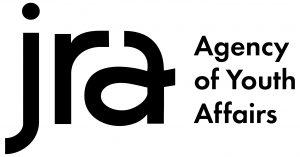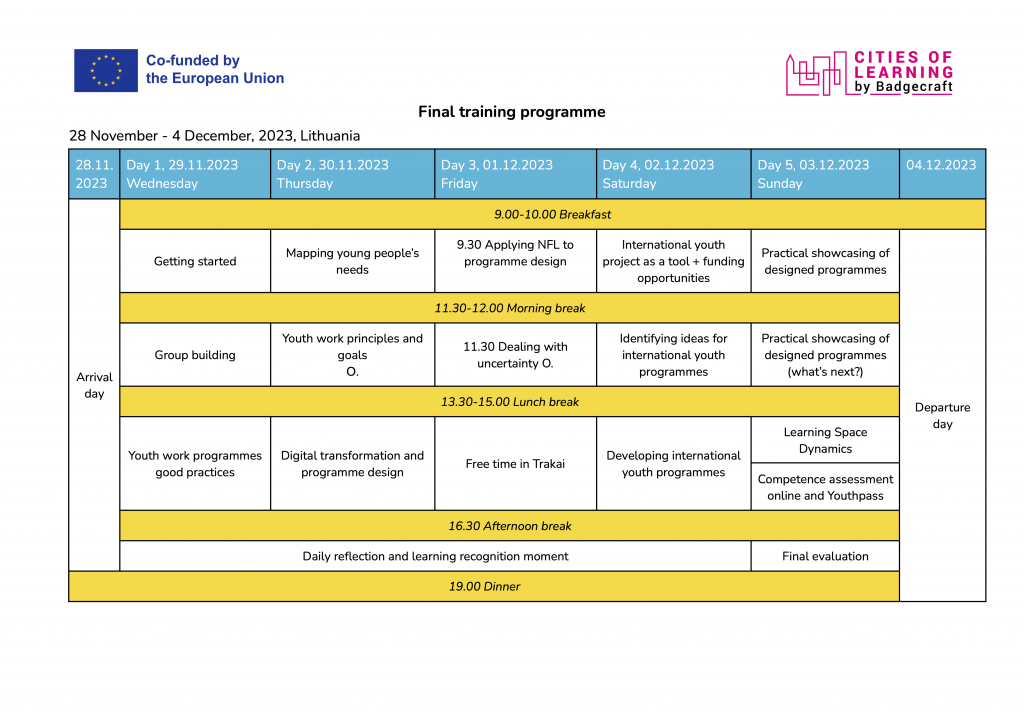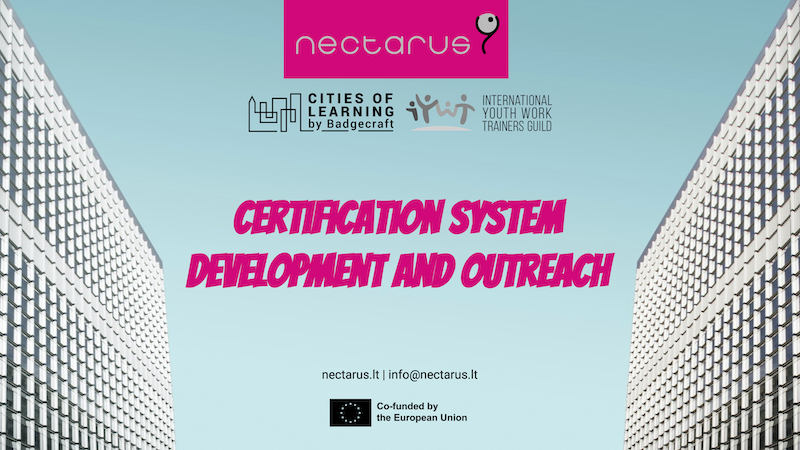Youth Workers and Trainers Modular Trainings and Certification

Nectarus team together with Cities of Learning partners, International Youth Work Trainers Guild and European Youth Workers Association is creating a good practice example in Europe on how the European Training Strategy can be translated into specific actions – a set of modular training courses for youth workers and trainers.
We are building the training, recognition and certification framework within which we can have a European offer for our partners, youth workers and trainers. It will provide training on international youth worker competences, as a complementary activity to what youth workers are trained on locally or nationally.
Goal – to improve the quality of international youth work through the implementation of the European Training Strategy (ETS) modular training courses based on the ETS competence model for youth workers and trainers working internationally.
We aim to provide more opportunities for the competence-based development of youth workers and trainers and respond to the European Training Strategy (ETS), closely linked to the European Youth Work Agenda (EYWA).
Key objectives
- To develop professional competences of youth workers working internationally through 9 modular courses based on the ETS competence model for youth workers.
- To develop professional competences of trainers for implementation of international youth work training by delivery of 9 modular training courses based on the ETS competence model for trainers.
Transversal objective: to develop and implement certification of youth workers and trainers by using digital Open Badges aligned with the ETS competence models for youth workers and trainers working internationally.
Forseen impact
We foresee the following impact on youth workers, who will attend our training courses and gain digital credentials:
- Increased competences to implement international youth work
- Increased satisfaction of participants’ jobs and new professional opportunities due to increased competences.
- Increased recognition of their skills and better visibility of the youth worker profession.
- More contacts and wider networks among participants and their organisations to initiate international cooperation projects within the Erasmus+ programme and beyond
- Increased competences will lead to better quality youth work. Therefore indirectly our training courses will create a wider impact on youth work approaches, methodologies and higher quality youth work.
We foresee the following impact on trainers, taking part in our courses:
- Increased competences to train their target groups: other youth workers, young people, project managers, institutions, etc.
- Increased quality of training activities in the field of youth
- Wider adoption of the competence-based approach in designing new training activities by participants.
- Increased satisfaction of trainer’s own performance and higher satisfaction of participants on the training courses they will attend
On the organisational level:
- Increased capacity of staff will lead to more quality educational offers made by organisations
- Organisations will gain valuable cooperation contacts for their future projects
- Organisations will be more aware of the European Training Strategy and European Youth Work Agenda and ways they can utilise it to their benefit.
- Our project partners will be able to offer extra opportunities for trainers and youth workers from their countries, next to the national training opportunities.
Partner organisations
Below is the list of partner organisations who are actively engaged in promoting, supporting and participating in this action. They will recruit and support participants and will contribute to establishing youth workers’ and trainers’ recognition and certification systems at local, national and international levels.
- Gyumri “Youth Initiative Centre” NGO (YIC), Armenia
- Youth Workers’ Association of Georgia
- “MilleniuM” Training and Development Institute, Moldova
- Plattform Generation Europa, Austria
- PlanBe, Plan it Be it, Cyprus
- Hyvärilä youth and holiday centre, Finland
- International Youth Work Trainers Guild, International
- System and G, Greece
- Hellenic Youth Workers Association, Greece
- Élményakadémia KHE / Academy of Experience, Hungary
- Youth Work Ireland Midlands
- Confartigianato Salerno, Italy
- NINFEA, Italy
- Wild Routes, Italy
- Ex Emigranti, Italy
- Madiba Società Cooperativa Sociale, Italy
- Associazione Interculturale NUR, Sardinia, Italy
- InCo Association, Italy
- Breakthrough, the Netherlands
- Union for Youth Work, North Macedonia
- Associação Par – Respostas Sociais, Portugal
- Asociatia Babilon Travel, Romania
- BalkanIDEA Novi Sad, Serbia
- TiPovej!, Institute for creative society, Slovenia
- NaturKultur e.V., Germany
EU Programme Erasmus+ co-funds this action under the Accreditation granted by The Agency of Youth Affairs – the Lithuanian National Agency for Erasmus+ Youth and the European Solidarity Corps.


During 2023-2027, we will provide a modular and competence-based approach to the development of youth workers working internationally, as identified in the European Training Strategy’s competence model for youth workers.
Partners will design curricula for 9 modular training courses, each based on one ETS competence area:
- Facilitating learning
- Designing programmes (completed)
- Managing resources
- Collaborating in teams
- Communicating meaningfully
- Displaying intercultural sensitivity
- Networking and Advocating
- Assessing and evaluating
- Being civically engaged
We will prepare and deliver 9 courses for youth workers with an average group of 24 people per course. Organisers will train at least 72 youth workers, expecting that on average each youth worker will take 3 modular training courses.
Participants will be able to identify their professional development needs by using the online Yocomo Self-Assessment tool, based on all 9 ETS competence areas.
Planned: Training on Facilitating Learning competence area
Dates: 4-10 July 2024
Completed: Training on Designing programmes competence area
Dates: 28 Nov-4 Dec
27 participants from 14 countries
Activity link: https://www.youthworkpathways.net/en/activities/16859

During 2023-2027, we will provide a modular and competence-based approach to the development of youth workers working internationally, as identified in the European Training Strategy’s competence model for trainers.
Partners will design curricula for 9 modular training courses for trainers, each based on one ETS competence area:
- Understanding and facilitating learning
- Learning to learn
- Designing educational programmes
- Cooperating in teams
- Communicating with others
- Intercultural competence
- Being civically engaged
- Digital Competence (planned)
- Self-management and well-being
We will prepare and deliver 9 courses for trainers with an average group of 24 people per course. Organisers will train at least 72 trainers, expecting that on average each trainer will take 3 modular training courses.
Participants will be able to identify their professional development needs by using the online Appraiser Assessment tool, based on all 9 ETS competence areas.
Youth workers and trainers will earn open digital badges as new innovative micro-credentials, which are data-rich and provide evidence of learning. Each badge will be linked with a specific set of skills, knowledge and attitudes. Participants will collect their development portfolio based on open badges. It can be shared across social and professional networks or exported as a PDF.
- Youth Work Pathways to Professional Development and Recognition platform
- Competence development platform for trainers
The Nectartus team in cooperation with partners will make sure that badges are well-aligned and contain relevant competence tags, making badges aligned to the national competence frameworks of youth workers and trainers, if these exist.
Watch a video explaining the Certification System Development concept:
Download the Certification System Development and Outreach plan.


